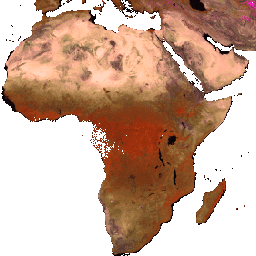Page Summary
-
The WHBU/NBAR_1YEAR dataset provides annual mosaics of Nadir BRDF-Adjusted Reflectance (NBAR) derived from MODIS data, available from 2000 to 2017.
-
These mosaics are created by selecting the best quality observations from the MODIS 8-day products over a 1-year period.
-
The dataset has been used by government agencies and NGOs for generating aboveground biomass/carbon maps in tropical countries.
-
The data includes seven bands representing Nadir Reflectance at local solar noon for different wavelengths, with a pixel size of 463 meters.
-
MODIS data and products acquired through the LP DAAC have no restrictions on subsequent use, sale, or redistribution.

- Dataset Availability
- 2000-02-18T00:00:00Z–2017-01-01T00:00:00Z
- Dataset Producer
- Baccini, A. (Woods Hole Research Center), Sulla-Menashe, D. (Boston University)
- Cadence
- 1 Year
- Tags
Description
The mosaics are created by using the MODIS 8-Day 500 meter BRDF-Albedo Quality product. Data Quality flags are used to select the best observations from the MODIS 8-day 500 meter Nadir BRDF-Adjusted Reflectance imagery product. This specific mosaic picks observations from the three highest quality categories over a 1-year period of MODIS data.
The MODIS NBAR annual mosaics have been used by government agencies and NGOs in tropical countries as input to generate aboveground biomass/carbon maps. The Woods Hole Research Center has been using the dataset for country capacity building and technical training workshops in tropical countries.
Bands
Pixel Size
463 meters
Bands
| Name | Pixel Size | Wavelength | Description |
|---|---|---|---|
Nadir_Reflectance_Band1 |
meters | 620-670nm | Best NBAR at local solar noon for band 1 |
Nadir_Reflectance_Band2 |
meters | 841-876nm | Best NBAR at local solar noon for band 2 |
Nadir_Reflectance_Band3 |
meters | 459-479nm | Best NBAR at local solar noon for band 3 |
Nadir_Reflectance_Band4 |
meters | 545-565nm | Best NBAR at local solar noon for band 4 |
Nadir_Reflectance_Band5 |
meters | 1230-1250nm | Best NBAR at local solar noon for band 5 |
Nadir_Reflectance_Band6 |
meters | 1628-1652nm | Best NBAR at local solar noon for band 6 |
Nadir_Reflectance_Band7 |
meters | 2105-2155nm | Best NBAR at local solar noon for band 7 |
Terms of Use
Terms of Use
MODIS data and products acquired through the LP DAAC have no restrictions on subsequent use, sale, or redistribution.
Citations
Baccini, A., Laporte, N., Goetz, S. J., Sun, M., & Dong, H. (2008). A first map of tropical Africa's above-ground biomass derived from satellite imagery. Environmental Research Letters, 3(4), 045011. doi:10.1088/1748-9326/3/4/045011
DOIs
Explore with Earth Engine
Code Editor (JavaScript)
var dataset = ee.ImageCollection('WHBU/NBAR_1YEAR'); Map.addLayer(dataset.mean(), {min:0, max:7000});